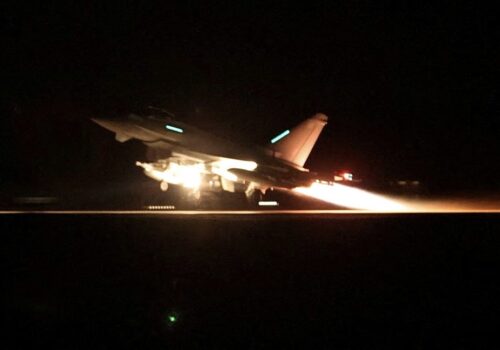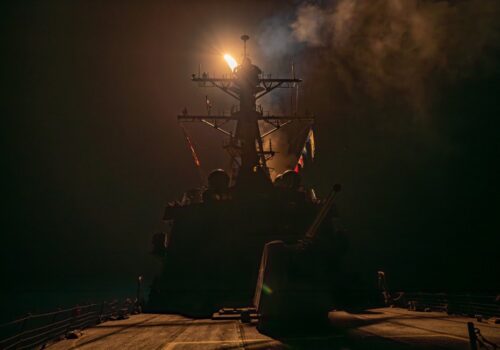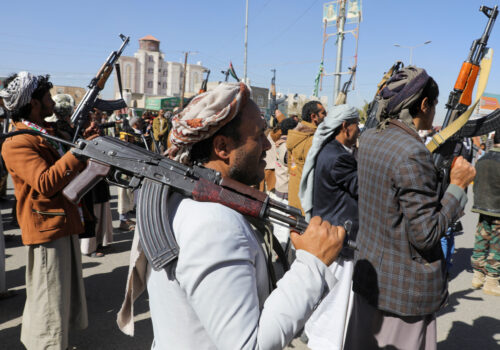The Houthis are again ‘specially designated global terrorists.’ Here’s what that means.
It’s a title fight. On Wednesday, the United States designated the Yemen-based Houthi rebels, also called Ansar Allah, as a specially designated global terrorist (SDGT) group. Recent attacks by the Iran-backed group on Red Sea shipping “fit the textbook definition of terrorism,” explained National Security Advisor Jake Sullivan. The Biden administration’s label, which follows US strikes on the group, departs from the approach used by the Trump administration, which additionally listed the group as a foreign terrorist organization (FTO). Below, specially designated Atlantic Council experts explain what’s in a name and what to expect next.
1. What is the difference between a “foreign terrorist organization” and a “specially designated global terrorist”?
Foreign terrorist organization (FTO) sanctions are the gold standard of terrorism sanctions. An FTO designation has three unique features that a specially designated global terrorist (SDGT) designation lacks. First, federal law makes it a crime to provide “material support or resources” to a designated FTO, making the group radioactive and causing global banks, insurers, and other companies to cut all ties with the group. Second, members of an FTO are automatically inadmissible to the United States. Third, victims of terrorist attacks and their survivors are able to file civil lawsuits against FTOs and the entities that support them, ensuring justice for victims and increasing financial pressure on the groups.
—Nathan A. Sales is a nonresident senior fellow with the Atlantic Council’s Scowcroft Middle East Security Initiative and Middle East Program and a former US ambassador-at-large and coordinator for counterterrorism.
The two designations impose different penalties. Being an SDGT gives the US Treasury Department the ability to disrupt terrorists’ access to funds in the United States and elsewhere in the international financial system. Being designated an FTO by the US State Department makes it illegal for anyone to give the group “material support,” including fighting for the group, giving it money or in-kind support, or training. Members of FTOs who are not US citizens are almost always banned from entry into the United States, except where there is a rare, high-level decision otherwise. Most powerfully, anyone who provides material support to a designated FTO is considered a Tier III terrorist and is subject to sanctions and a travel ban. This makes it difficult and legally risky for others to have contact with a designated FTO.
After the Houthis began missile, drone, and small-boat attacks on international shipping, the Biden administration in December put together an international coalition, Operation Prosperity Guardian. As Houthi attacks continued, the Biden administration decided to designate the Houthis as an SDGT to disrupt their access to international financial markets. Designating the Houthis as an FTO would make it harder, though not impossible, to engage in diplomacy with the Houthis, but the Biden administration retains the option of designating the Houthis as an FTO.
—Thomas S. Warrick is the director of the Future of DHS project at the Scowcroft Center for Strategy and Security’s ForwardDefense practice and a nonresident senior fellow and the Scowcroft Middle East Security Initiative at the Atlantic Council. He previously served as deputy assistant secretary for counterterrorism policy in the US Department of Homeland Security.
2. Why are the Houthis involving themselves in the war between Israel and Hamas?
The Iranian regime for decades has provided the Houthis funding, weapons, training, and vital components for missiles and drones. Two US Navy SEALs recently had their lives put at risk intercepting Iranian missile warheads being sent to the Houthis. Since Hamas’s October 7 terrorist attack on Israel—Hamas also receives money, weapons, and training from the Iranian regime—Iran has been urging its proxies, including those in Yemen, Lebanon, and Iraq, to carry out attacks against the United States and Western interests.
Iran’s stated strategic interest is a Hamas victory over Israel—Hamas expects to declare victory if it stays in power in Gaza when the shooting stops. The Houthis sit astride one of the world’s most strategic waterways: international shipping lanes between Europe and North America in the west and China and South Asia in the east. Attacks by Iranian proxies against US forces or Israel from Iraq or Syria are obviously of direct concern to the countries involved, but the Houthis’ attacks against international shipping in the Red Sea require an international response.
—Thomas S. Warrick
3. How is the Biden administration approaching this differently from the Trump administration?
In the waning hours of the Trump administration in January 2021, the Houthis were designated as both an SDGT and an FTO. The Biden administration rescinded this in February 2021 in part to allow diplomacy to resolve the ongoing civil war between the internationally recognized government of Yemen, run out of the southern port city of Aden, and the Houthis, whose capital is Sanaa. US partners Saudi Arabia and the United Arab Emirates had backed the internationally recognized government, but fighting had stalled.
The Houthis’ repeated missile, drone, and small-boat attacks has caused the Biden administration to respond militarily and by re-imposing sanctions through the SDGT designation.
—Thomas S. Warrick
Even though the Houthis ticked every box in the legal definition for applying an FTO designation, the Trump administration initially refrained from designating at the request of the UN World Food Program, which assessed that millions of civilians would die from a lack of access to aid if they were unable to work through the Houthis to deliver assistance in Houthi-controlled areas of Yemen. When waivers had been worked out, the designation was applied. When Biden undesignated the Houthis in 2021, he had two goals in mind. One, to enable aid groups to deliver assistance in Houthi-controlled areas of Yemen.
And two, to show an act of goodwill toward the Houthis that the new Biden administration hoped would incentivize them to participate in good faith in political talks. That was a political experiment. Now, after three years of the Houthis hemming and hawing in these talks, the Biden team thinks differently and now believes that re-designating them will not endanger the talks any more than the Houthis’ own intransigence regularly does.
—Kirsten Fontenrose is a nonresident fellow at the Scowcroft Middle East Security Initiative in the Atlantic Council’s Middle East Programs. She was previously the senior director for the Gulf at the National Security Council.
4. What will be the practical effect on the Houthi rebels from this designation?
The redesignation of the Houthis as an SDGT is somewhat unique in that the action will not take effect for another thirty days. This is to allow for humanitarian aid groups to adjust their operations or seek licenses to avoid exposure to sanctions. However, this also provides the Houthis and Iran time to adjust their own financial flows and mitigate the possible implications of sanctions.
—Kimberly Donovan is the director of the Economic Statecraft Initiative within the Atlantic Council’s GeoEconomics Center. She was previously the US Treasury Department’s acting associate director of the Financial Crimes Enforcement Network’s (FinCEN) Intelligence Division and FinCEN’s chief of staff and senior advisor to the director.
The more modest SDGT sanctions the Biden administration adopted—which lack the powerful criminal ban on third parties providing material support—will not isolate the Houthis from international commerce and the international financial system in the same way that the FTO sanctions would have (and did, during the Trump administration). Commercial entities that want to avoid criminal liability in the United States will not have the same strong interest to sever all ties with the Houthis.
—Nathan A. Sales
The Houthis have few if any assets in US financial institutions, but the SDGT designation will slow down and in some cases block their ability to do business through international financial institutions. This also signals the willingness of the Biden administration to use further measures if the Houthis continue their attacks.
—Thomas S. Warrick
There are two potential impacts on the Houthis. First, there could be an impact on the Houthis’ ability to conduct attacks against global shipping. While the Houthis don’t have US bank accounts to freeze, they do rely on the Islamic Revolutionary Guard Corps’ network of financiers and front companies to receive specialized components for their missiles and drones. The sources for these components are often commercial (and unwitting) and are part of the international financial system. So this designation could impact the Houthi weapons supply chain in the medium term.
Second, there could be an impact on Biden’s ability to use the US military to reduce the severity of Houthi attacks against global shipping. Biden could need congressional buy-in to continue US-led strikes against the Houthis, according to the US War Powers Resolution. This SDGT designation helps Biden make the legal case to Congress that the Houthi threat merits continued military action. So this designation could extend US-led coalition strikes against Houthi materiel, more significantly degrading their war machine.
—Kirsten Fontenrose
5. What message does this send to Iran?
I fear that Tehran will see the SDGT sanctions as a half measure and conclude that the White House is not serious about using all the tools at its disposal to counter Iran-backed terrorism. Above all, the Biden administration needs to send a clear message to the Iranian regime, through actions and not just words, that it will hold the regime itself accountable for the actions of its terror proxies (in Yemen, Gaza, Lebanon, Iraq, and elsewhere), and it will not indulge the fiction that these groups are acting on their own.
—Nathan A. Sales
Not much of one, unfortunately. But it is important for the United States to demonstrate that it is exercising all tools of statecraft, and not simply kinetic action, to make sure the international community sees clearly that the country is acting responsibly and in the global interest.
—Kirsten Fontenrose
6. How might this designation affect the broader Yemeni population?
International sanctions do not prohibit the import of humanitarian aid, but many international aid organizations are reluctant to work with a designated terrorist group. The US government and other governments try to provide workarounds by licensing certain transactions by recognized aid organizations, but this does not always lead to the free flow of humanitarian aid. Aid organizations try to get aid to those who most need it, but the Houthis, like other designated terrorist groups that control territory (for example, Hamas), have the physical ability to decide, if they want to, who gets aid in territories they control.
—Thomas S. Warrick
7. What other tools does the US have to pressure the Houthi rebels at this point?
The United States has several tools left in the economic statecraft toolbox to pressure the Houthis, including redesignating the group as an FTO and encouraging US partners and allies to take similar actions. Separate from the SDGT designation, the US Treasury Department took action last week targeting individuals and entities involved in the sale of Iranian commodities that generate funds for the Houthis. I expect the United States will continue to identify and target similar activity to cut off funding for the Houthis and other Iranian partners and proxies.
—Kimberly Donovan
In addition to economic statecraft, the United States has two arrows in its quiver: diplomacy and the option to continue military strikes against Houthi tools of war.
Opposition to Houthi attacks on global shipping is one issue that sees the United Nations Security Council in rare near-alignment. While Russia abstained from the vote demanding the Houthis cease attacks, it did not veto. Neither did China. Like the United States, both nations have an interest in maintaining the flow of trade through shipping chokepoints in the Middle East. Combined pressure would be more likely to yield results than the United States acting alone, particularly when it comes to dealing with Tehran, where Russia and China have greater leverage.
And the United States retains the option to increase or extend its coalition-supported strikes against Houthi targets. Tit for tat, with each attack that the Houthis conduct, they give the coalition that has formed in the Red Sea the justification to retaliate, little by little destroying the Houthis’ weapons stockpiles, launchers, and assembly factories.
—Kirsten Fontenrose
The United States and its allies can strike additional military targets, including drones in hangars, missiles in storage bunkers, and boats in port—though the Houthis make it harder by using small boats that look like civilian fishing or merchant boats. Most strikes until now have focused on targeting the Houthis’ ability to carry out further attacks, but obviously the Houthis can make more missiles and drones, at least as long as they have the necessary components.
If the Houthis continue to attack commercial shipping, the United States is likely to strike more strategic targets such as military vehicles, bases, missile manufacturing sites, and command-and-control facilities. The goal would be to get the Houthis to stop attacking shipping in the Red Sea. If the attacks continued, above that in the escalation ladder would be attacks on the Houthis’ political leaders or Iranian targets in the Indian Ocean or Iran itself. Iran has shown no indication it is urging the Houthis to stop their attacks.
—Thomas S. Warrick
Further reading
Thu, Jan 11, 2024
Experts react: What to know about US and UK strikes on the Houthis in Yemen
New Atlanticist By Atlantic Council experts
Atlantic Council experts share their insights about the strikes and about what to expect next—including how Iran might respond.
Fri, Jan 12, 2024
Six big questions about US-led strikes against the Houthis, answered
MENASource By Kirsten Fontenrose
Ahead of authorizing the strikes, Biden had to carefully consider arguments for and against conducting strikes to limit the Houthis’ capacity to continue waging war on international shipping.
Fri, Jan 12, 2024
The lessons Washington needs to learn from the strike on the Houthis
New Atlanticist By William F. Wechsler
The United States can no longer afford to underestimate the threat posed by the Houthis, much less the threat posed by the wider network that supports Iranian malign behavior.
Image: A Houthi policeman takes part in a protest against recent US-led strikes on Houthi targets, near Sanaa, Yemen January 14, 2024. REUTERS/Khaled Abdullah




